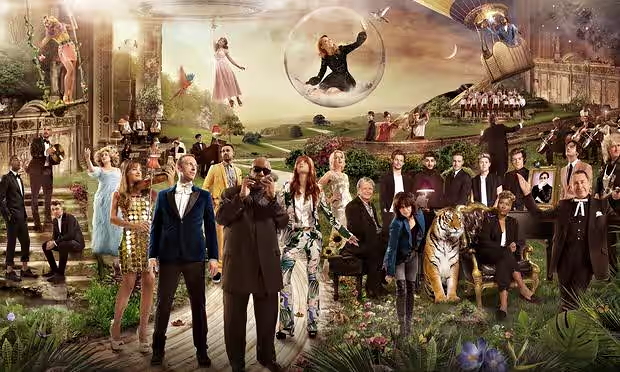On October 7, 2014, the BBC unveiled a cultural masterpiece: a reimagining of The Beach Boys’ 1966 classic “God Only Knows.” This wasn’t just another cover—it was a breathtaking convergence of 27 iconic artists from across genres, eras, and continents, all woven into a three-minute symphony of visual and auditory splendor. Dubbed the “Impossible Orchestra,” this project celebrated the launch of BBC Music while raising funds for BBC Children in Need. Its journey—and its legacy—remain unmatched in music history .
🌟 The Vision: An “Impossible Orchestra”
The concept was audacious: unite legends like Brian Wilson (the song’s original creator), Stevie Wonder, Elton John, and modern icons like Pharrell Williams and Lorde, alongside classical virtuosos such as Nicola Benedetti and the BBC Concert Orchestra. The goal? To embody the BBC’s ethos of musical diversity and universality. As Director of BBC Music Bob Shennan noted, it was a “love letter to music itself” .
🎬 Behind the Scenes: An 18-Month Odyssey
Creating this mosaic required Herculean coordination:
- Recording logistics: Artists filmed separately across three continents, with some (like Chris Martin) lying on their backs in symbolic vulnerability, and Brian Wilson appearing with a surreal tiger painting .
- Technical artistry: The arrangement honored The Beach Boys’ avant-garde roots, opening with the BBC Concert Orchestra “tuning up”—a nod to Brian Wilson’s experimental Smile sessions .
- Charity mission: Released as a charity single, it amplified BBC Children in Need’s impact, merging artistry with altruism .
🎭 Standout Moments: A Galaxy of Stars
Each artist delivered micro-performances that sparked global chatter:
- Brian Wilson (0:58–1:01): The composer’s understated delivery was poignant: “If you should ever leave me” felt like a whisper from music history .
- Pharrell Williams (0:34–0:37): Rolled trousers and a half-crouch walk stole focus—proving his flair for the unexpected .
- Kylie Minogue (1:06–1:09): Her crystal-clear vocals were hailed as the “spiritual heir to Wilson’s clarity” .
- Stevie Wonder (1:10–1:14): Defied structure by stretching “me” into a four-second marvel—the “Tales From Topographic Oceans of single lines” .
🌍 Cultural Impact: Breaking the Internet
The video trended globally, amassing millions of views within hours. Critics praised its ambition, though some quibbled over quirks (Florence Welch’s vibrato, Jake Bugg’s relegated “la-la-la’s”). Yet its triumph was undeniable:
- It became BBC Music’s defining moment, showcasing genres from jazz (Gregory Porter) to electronic (Brian May’s fireplace-made guitar solo) .
- At the 2014 BBC Music Awards—where Pharrell won Song of the Year for “Happy”—the project symbolized music’s unifying power. His satellite speech echoed the collaboration’s spirit: “The UK lifted my life to unimaginable heights” .
⏳ Legacy: More Than a Cover
A decade later, this “God Only Knows” remains a benchmark:
- Artistic precedent: It inspired later mega-collaborations (e.g., “Imagine” tributes), proving genre barriers are obsolete.
- Technical innovation: Its editing pioneered methods for remote artist integration—a template used during the 2020 lockdown virtual concerts.
- Timeless message: As Wilson himself sang, the song endures because “life would still go on.” But without this version? Music’s landscape would be poorer .
💫 Final Chorus
The BBC’s “God Only Knows” was more than a marketing triumph—it was a testament to music’s eternal connective tissue. In weaving icons across generations into a single tapestry, it reminded us that art, at its best, is a chorus of voices harmonizing against the noise of the world. As the final chords fade, one truth remains: only music could unite such brilliance. And that is no impossibility.
“We’ve remade The Beach Boys masterpiece… to celebrate our love of music.”
— BBC Music, 2014

